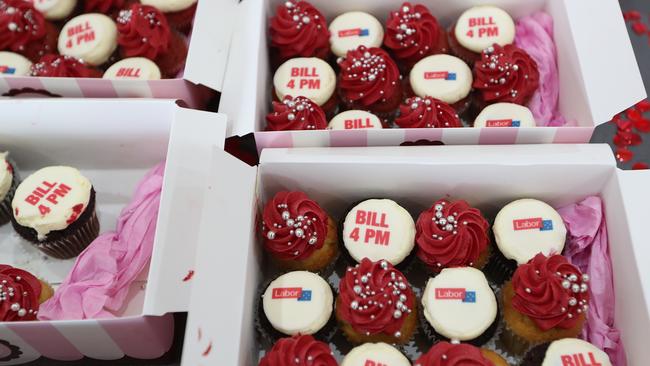Miranda Devine: Labor rallies true believers with Whitlam’s ‘It’s time’ cry
It was a peculiar choice for Bill Shorten to turn his final speech of the campaign into an attempt to emulate the most polarising Prime Minister in Australian history at a time when he needs to reassure swinging voters that he is a safe bet, writes Miranda Devine.
- What’s driving Bill Shorten’s quest to be Prime Minister?
- Shorten’s ruthless lunge for power has been laid bare
From the look of the 1970s-style giant ball lights, “It’s Time” T-shirts, and Little Pattie in the front row, not much has changed in Blacktown’s Bowman Hall in the 47 years since Gough Whitlam delivered the iconic speech which spearheaded his dynamic 1972 election victory.
But it was a peculiar choice for Bill Shorten to turn his final speech of the campaign into an attempt to emulate the most polarising Prime Minister in Australian history at a time when he needs to reassure swinging voters that he is a safe bet.

MORE OPINION:
One ‘day’ a year isn’t enough for mental health
Rich and wild in Sydney’s north
Science has proven social media ‘influencers’ wrong
Women and Men of Australia!” boomed Shorten on the small stage, echoing Whitlam’s words to a cheering crowd of True Believers.
“Forty-seven years ago, when an earlier Labor generation filled this hall with their hope and their passion the door was ajar for our nation. And Australians had to choose.
“Once again, we put it to the men and women of Australia, from this hall. Our nation must choose: The habits and fears of the past … or the demands and opportunities of the future … And we ask the men and women of Australia to vote for change.
“On May the 18th, we ask you to vote for new ideas, for new equality of opportunity. We ask you to vote for new purpose and new energy in a new decade. And we ask you to vote for the new vision, the new stability and the new determination of a new Labor government.”
The red-clad faithful in Bowman Hall loved it, especially when he described his opponents as the “Coalition of chaos”.

But, out in middle Australia, where the election is still to be won, Whitlam nostalgia is the last thing to commend a future prime minister.
Whitlam’s abbreviated reign, which promised so much in 1972 to a country weary of more than two decades straight of Liberal rule, was marked by an economic shambles, crises and scandals, soaring inflation, a wages breakout and social upheaval.
It collapsed in ignominy, as Whitlam became the only prime minister to be sacked controversially by the Governor-General.
As a result, of course, the biggest cheer Shorten received on Thursday was his republican pitch from a Labor Party still furious about that monarchical intervention: “It’s time for an Australian Head of State!”

Labor is good at mythologising its leaders, and none so much as Whitlam, their tragic hero.
But far from ushering in a new era of hope and change, Whitlam personified the vicious ideological schism in Australia. That really is the one thing Shorten has in common with the Labor idol.
Local MP for the safe Labor seat of Greenway, Michelle Rowland, introduced Labor deputy leader Tanya Plibersek, describing her, curiously, as the reason the party was in a “competitive position” in the election.
Plibersek more closely emulated, not Whitlam, but Hillary Clinton, when she maligned Coalition supporters as “sceptics, deniers … flat-earthers (who) cheer on hatred or fear … backward pushers of division”.
A standing ovation ensued for the “Champion of fairness for working people, the next prime minister of Australia, Bill Shorten”.

Shorten’s speech had echoes of Whitlam but focused on climate change and criticism of the government.
“Extremism and racism are not the way forward. Chaos and division are not the way forward.
And denial and delay on climate change is not the way forward.”
With the audience demographic closer to 60 than 20, there was no sign of the youthquake that energised Whitlam’s “It’s Time” campaign in the 1970s. The Boomer generation who switched on to Whitlam then don’t appear to have inspired a modern counterpart.
Shorten, who was a preschooler in 1972, did his best to re-create the excitement that propelled Whitlam to power, but it felt contrived and a little flat.
The rousing reception probably gave Shorten a shot of confidence to head into the last gruelling hours of the campaign. But it won’t have shifted any votes towards him at this crucial stage.
And chances are there will be retirees who lived through the Whitlam era who will run screaming into Morrison’s arms at the memory.
Twitter @mirandadevine


